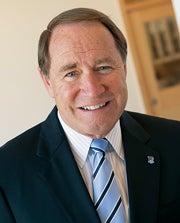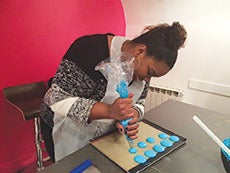President’s View

The 2016-2017 academic year will be a time for Thinking Big. That’s only fitting as we welcome the illustrious class of 2020, students who were selected from the largest—and most qualified—pool of applicants in URI’s history.
We’re thinking especially big this November, when we turn to Rhode Island voters to ask their approval for a bond that has the potential to further solidify our position as a premier public research institution.
Approval of Question 4—a $45.5 million bond leveraging higher education to create 21st century jobs—is all about making capital investments in higher education-related projects that foster innovation and economic growth.
Of the $45.5 million, $20 million will fund the University of Rhode Island Affiliated Innovation Campus. What is an innovation campus? We envision a center where universities and businesses will collaborate on cutting-edge research that can be applied to create new products and services. The state plans to run a competitive selection process to determine the location and type of campus or campuses to build. The winning proposal must involve URI, more than match the state’s investment with private and/or federal funds, include at least one business partner, and spur a substantial number of new jobs at a variety of skill levels.
We couldn’t be more pleased that thanks to our strong relationships with the state’s government, business, and higher education communities, URI has been designated as the lead institution in the innovation campus. It’s a testament to our increasingly visible commitment to Rhode Island’s economic development.
The remaining $25.5 million in the bond will allow us to embark on phase two of the College of Engineering renovation for which voters overwhelmingly approved $125 million in 2014. We remain extremely grateful for the role our alumni played in that victory. New bond funds will help us to construct an addition to historic Bliss Hall, the oldest College of Engineering building. We also plan to restore the building and upgrade building systems, improve classrooms, modernize teaching laboratories, and provide advanced research facilities for the next generation of engineering students and faculty.
I’ve written extensively in these pages about engineering, one of the pillars of our academic strength; each entering class has a stronger academic profile than the last. I want to share just one example of why investing in engineering through Question 4 matters.

Last May, Arielle De Souza received the prestigious French Consulate in Boston Excellence Award, which is given every year to a New England college student who has promoted French language and culture. The only woman selected in the award’s three-year history, Arielle graduated in May from our five-year International Engineering Program with impressive academic and co-curricular achievements. French was a new language for Arielle, but she pursued it with a passion. As part of the International Engineering Program, she spent six months at the Université de Technologie de Compiègne and then interned for six months at a French engineering company analyzing storm surge on the French Atlantic coast. Arielle, who has returned to France to pursue her master’s degree, beautifully summed up how she was shaped by her IEP experience: “It’s so important as a millennial to become a global citizen. You can’t fully understand yourself as a person until you’ve experienced another culture. We live in a global world.” The IEP prepares scholars like Arielle not only to live, but also to lead, in a global world.
Your vote in November will make a difference.
David M. Dooley
President, University of Rhode Island
 Home
Home Browse
Browse Close
Close Events
Events Maps
Maps Email
Email Brightspace
Brightspace eCampus
eCampus


